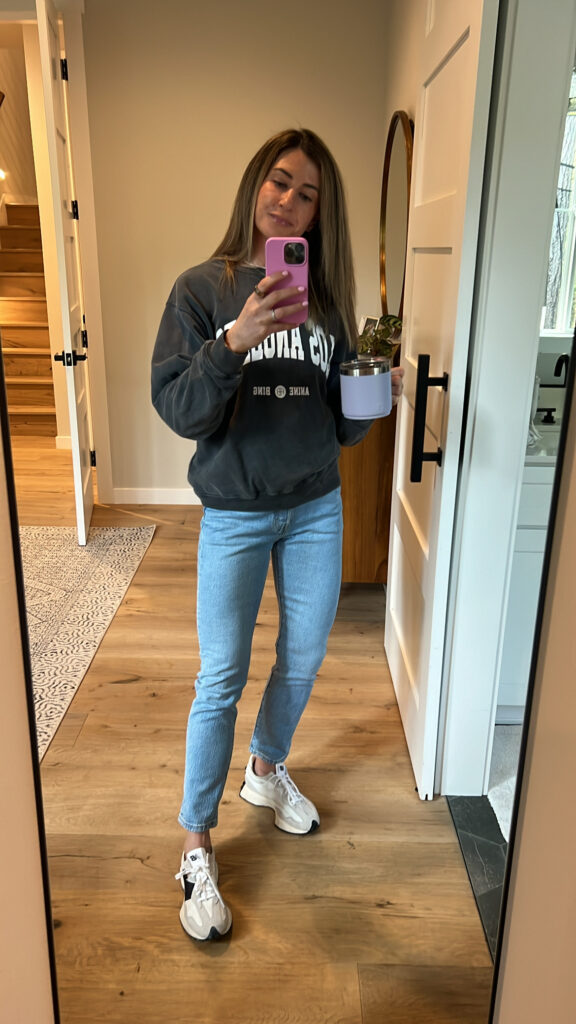
More is not always better when it comes to supplements. If you’ve been following along for a while, then you know I’ve been on a journey to significantly cut back on my supplements. Since that post I have also stopped taking Athletic Greens supplement. I have started to make an even more conscious effort to ensure I am getting in important nutrients through food and not relying on supplements. Why? Because food first is always the best dietary approach. It’s so much better to get your vitamins through food and our bodies are meant to get nutrients from food, not supplements.
More than ever, people are blindly taking supplements and being influenced by people who have no business promoting supplements on the internet. Supplements are not regulated and it’s tough to know what you’re really getting and the bioavailability of the supplement. It can be difficult to know if a supplement is helping or doing more harm (or just a waste of money); however, we have a ton of evidence to show long term health benefits from eating more plants.
No supplement can match a good diet and exercise routine in helping prevent many chronic diseases. Here are some foods I’m prioritizing in my diet and relying less on supplementation.
PRE & PROBIOTICS
I used to believe everyone needed to be taking a probiotic. Gut health is such a hot area of research right now and there is still so much we don’t know about it. However, from my research I no longer believe everyone needs to take a supplement. There are certain medical conditions when a probiotic supplement would be helpful, but in order to support “general” gut health, simply eating a diverse plant rich diet is the best way to achieve a happy gut. I recently stopped taking Athletic Greens which was my main source of pre and probiotics. I’m now very mindful to get in at least 2-3 servings of the below foods a day.
PREBIOTIC FOOD: bananas, garlic, onions, leeks, chicory root (insulin chicory root is what is often added to popular prebiotic sodas), Jerusalem artichoke, asparagus, apples, oats, barely, kiwi, legumes, potatoes.
PROBIOTIC FOODS: yogurt and kefir (make sure they contain live and active cultures), sauerkraut, tempeh, kimchi, low sugar kombucha, miso, and pickles.
VITAMIN C
I stopped taking a trendy Elderberry and Vitamin C supplement I had been taking for a while because it was popular and I figured why not. Taking a vitamin C supplement is likely no harmful, it’s also not necessary. It’s so easy to get enough vitamin C naturally through your diet that supplementation seemed to be a waste of money.
HIGH VITAMIN C FOODS: broccoli, bell peppers, strawberries, kiwi, Brussels spouts, oranges, tomatoes, potatoes, and mango.
VITAMIN B COMPLEX
So many clients recently are taking a B complex and have no idea why they are. While there is not a lot of harm with these supplements because they are water soluble (doesn’t get stored up in your body) there is likely not a lot of benefits either. I actually had high B12 on my recent lab work because of all the different supplements I was taking. Since stopping those supplements I’m simply focusing on a balanced diet. Most people don’t need a B supplement, unless they follow a vegan/vegetarian diet then there may be a need for B12 supplementation.
FIBER
Fiber is another hot nutrient and for a very good reason. It’s incredibly important to get adequate fiber in your diet I wrote a post here and here about it. The buzz around fiber had lead many people supplement using fiber gummies or other types fiber supplements.
HIGH FIBER FOODS: ground flax, chia seeds, avocado, beans, broccoli, oats, almonds, peas, whole grains, and all other fresh fruits and vegetables.
Hope this is helpful in motivating you to diversify and focus on diet instead of feeling like you need to buy every trendy supplement. Food first always 😉
xx, A